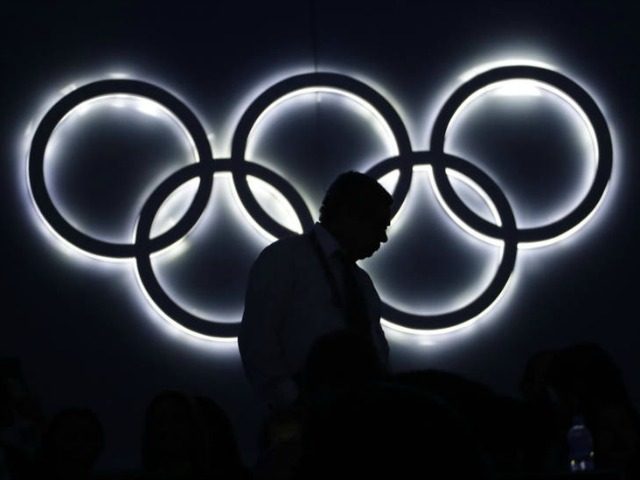As Evelyn Waugh demonstrated in his 1938 novel Scoop, unearthing a scoop doesn’t always work out as planned for the foreign correspondent. William Boot learned this working for the fictional Daily Beast. Nico Hines discovered it working for its real-life namesake.
The Daily Beast sent its London editor to Rio to cover the games athletes play in the bedroom rather than the ones they play on the track, field, court, and course. They won a gold medal in peeping-tom journalism.
Like so many in the Fourth Estate, Hines missed the story in front of him (a quadrennial competition of the planet’s best athletes) for a duh, non-story hiding behind well-placed bedroom walls (that gays exist among the ten-thousand-plus Olympians gathered and they engage in online trysts away from home). Call it outside-the-lines sports journalism on steroids. Like Grindr, it’s creepy.
Hines placed an ad on that casual-sex app for gay men in hopes of meeting them and mocking them. The three-year veteran of The Daily Beast boasts of scoring three “dates” with Olympians within an hour. Unlike, say, Harvey Milk or Dan Savage, Hines never directly outed any closeted gay man. But even though he doesn’t name his wannabe paramours he does describe them to the point where his editors eventually, but not initially, altered his story to protect identities.
Hines, like a quarter-tonner boasting that he ordered a quartet of Quarter Pounders without cheese, writes: “For the record, I didn’t lie to anyone or pretend to be someone I wasn’t—unless you count being on Grindr in the first place—since I’m straight, with a wife and child.” Surely he registers as not the first husband with a kid swiping on the site. But that he didn’t lie to anyone reads like a lie to everyone. As longshoreman philosopher Eric Hoffer, a man harboring many secrets, once wrote: “We lie loudest when we lie to ourselves.”
Hines’s major deceit came when he convinced himself he acted as a journalist in writing online what normally appears on the bathroom wall. Like William Boot working for that Daily Beast, Nico Hines working for this Daily Beast passed himself off as somebody else.
The editors come across as confused about the purpose of journalism as their reporter. “Today we did not uphold a deep set of The Daily Beast’s values,” the editors noted Thursday in deleting the controversial article. “These values—which include standing up to bullies and bigots, and specifically being a proudly, steadfastly supportive voice for LGBT people all over the world—are core to our commitment to journalism and to our commitment to serving our readers.”
When did standing up for this group or standing up to that group become the point of journalism?
And that’s the problem. Journalists do not understand their profession. Is it about clicks or quality? Taking a side or taking on all sides? The search for light and truth or the raking of grime and muck?
In an oversharing, TMI word-wide web, voyeurs imagine everyone as exhibitionists. But people go on Grindr, and on Tindr, OKCupid, and nearly the dozen other competitors of Grindr owned by The Daily Beast’s parent company, for anonymity, not exposure. That’s clear, and so is, despite what morally confused members of the press believe, the line between journalism and gossip. All publications not explicitly dedicated to not becoming The National Enquirer eventually become The National Enquirer.
Sports scribes, in particular, seem particularly lost without a compass. Upset that they failed to land a job with The Wall Street Journal or People or Mother Jones, jock journalists bored by the games they cover obsess over business angles, gossip, and politics. They miss what happens during competition. ESPN became MSNBC in this way. The Daily Beast imagined the Rio Olympics as an opportunity to write yet another article about homosexuals in this way. It, thankfully, backfired.
The creator of the original Daily Beast ironically received Daily Beast treatment posthumously. Author Paula Byrne, relying on less than convincing but more than thought-provoking evidence, writes that Evelyn Waugh experienced an “acutely homosexual phase” at Oxford in her book Mad World: Evelyn Waugh and the Secrets of Brideshead. She didn’t use Grindr to out the half-century dead Catholic novelist. She instead relied on a picture that some people saw but we can’t, cryptic letters, and evidence from a trio of long-since dead alleged male paramours. Even if she got every fact right, Byrne, like Hines, did something terribly wrong.
“He was wrong about the Battle of Hastings,” the dim-witted Daily Beast owner Lord Copper tells his foreign editor about a star reporter. “It was 1066. I looked it up. I won’t employ a man who isn’t big enough to admit his mistakes.”
Good for The Daily Beast to admit its mistakes. Bad for them to not know the answer, like Lord Copper, to such a basic question.

COMMENTS
Please let us know if you're having issues with commenting.